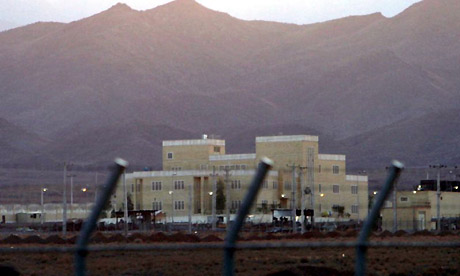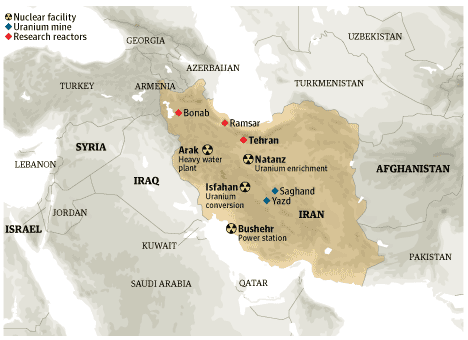US president told Israeli prime minister he would not back attack on Iran, senior European diplomatic sources tell Guardian
- guardian.co.uk,
- Thursday September 25 2008 19:02 BST
- Article history

A view of the nuclear enrichment plant of Natanz in central Iran. Photograph: EPA
Israel gave serious thought this spring to launching a military strike on Iran's nuclear sites but was told by President George W Bush that he would not support it and did not expect to revise that view for the rest of his presidency, senior European diplomatic sources have told the Guardian.
The then prime minister, Ehud Olmert, used the occasion of Bush's trip to Israel for the 60th anniversary of the state's founding to raise the issue in a one-on-one meeting on May 14, the sources said. "He took it [the refusal of a US green light] as where they were at the moment, and that the US position was unlikely to change as long as Bush was in office", they added.
The sources work for a European head of government who met the Israeli leader some time after the Bush visit. Their talks were so sensitive that no note-takers attended, but the European leader subsequently divulged to his officials the highly sensitive contents of what Olmert had told him of Bush's position.
Bush's decision to refuse to offer any support for a strike on Iran appeared to be based on two factors, the sources said. One was US concern over Iran's likely retaliation, which would probably include a wave of attacks on US military and other personnel in Iraq and Afghanistan, as well as on shipping in the Persian Gulf.
The other was US anxiety that Israel would not succeed in disabling Iran's nuclear facilities in a single assault even with the use of dozens of aircraft. It could not mount a series of attacks over several days without risking full-scale war. So the benefits would not outweigh the costs.
Iran has repeatedly said it would react with force to any attack. Some western government analysts believe this could include asking Lebanon's Shia movement Hizbollah to strike at the US.
"It's over ten years since Hizbollah's last terror strike outside Israel, when it hit an Argentine-Israel association building in Buenos Aires [killing 85 people]", said one official. "There is a large Lebanese diaspora in Canada which must include some Hizbollah supporters. They could slip into the United States and take action".
Even if Israel were to launch an attack on Iran without US approval its planes could not reach their targets without the US becoming aware of their flightpath and having time to ask them to abandon their mission.
"The shortest route to Natanz lies across Iraq and the US has total control of Iraqi airspace", the official said. Natanz, about 100 miles north of Isfahan, is the site of an uranium enrichment plant.
In this context Iran would be bound to assume Bush had approved it, even if the White House denied fore-knowledge, raising the prospect of an attack against the US.
Several high-level Israeli officials have hinted over the last two years that Israel might strike Iran's nuclear facilities to prevent them being developed to provide sufficient weapons-grade uranium to make a nuclear bomb. Iran has always denied having such plans.
Olmert himself raised the possibility of an attack at a press conference during a visit to London last November, when he said sanctions were not enough to block Iran's nuclear programme.
"Economic sanctions are effective. They have an important impact already, but they are not sufficient. So there should be more. Up to where? Up until Iran will stop its nuclear programme," he said.
The revelation that Olmert was not merely sabre-rattling to try to frighten Iran but considered the option seriously enough to discuss it with Bush shows how concerned Israeli officials had become.
Bush's refusal to support an attack, and the strong suggestion he would not change his mind, is likely to end speculation that Washington might be preparing an "October surprise" before the US presidential election. Some analysts have argued that Bush would back an Israeli attack in an effort to help John McCain's campaign by creating an eve-of-poll security crisis.
Others have said that in the case of an Obama victory, the vice-president, Dick Cheney, the main White House hawk, would want to cripple Iran's nuclear programme in the dying weeks of Bush's term.
During Saddam Hussein's rule in 1981, Israeli aircraft successfully destroyed Iraq's nuclear reactor at Osirak shortly before it was due to start operating.
Last September they knocked out a buildings complex in northern Syria, which US officials later said had been a partly constructed nuclear reactor based on a North Korean design. Syria said the building was a military complex but had no links to a nuclear programme.
In contrast, Iran's nuclear facilities, which are officially described as intended only for civilian purposes, are dispersed around the country and some are in fortified bunkers underground.
In public, Bush gave no hint of his view that the military option had to be excluded. In a speech to the Knesset the following day he confined himself to telling Israel's parliament: "America stands with you in firmly opposing Iran's nuclear weapons ambitions. Permitting the world's leading sponsor of terror to possess the world's deadliest weapon would be an unforgivable betrayal of future generations. For the sake of peace, the world must not allow Iran to have a nuclear weapon.''
Mark Regev, Olmert's spokesman, tonight reacted to the Guardian's story saying: "The need to prevent Iran from obtaining nuclear weapons is raised at every meeting between the prime minister and foreign leaders. Israel prefers a diplomatic solution to this issue but all options must remain on the table. Your unnamed European source attributed words to the prime minister that were not spoken in any working meeting with foreign guests".
Three weeks after Bush's red light, on June 2, Israel mounted a massive air exercise covering several hundred miles in the eastern Mediterranean. It involved dozens of warplanes, including F-15s, F-16s and aerial refueling tankers.
The size and scope of the exercise ensured that the US and other nations in the region saw it, said a US official, who estimated the distance was about the same as from Israel to Natanz.
A few days later, Israel's deputy prime minister, Shaul Mofaz, told the paper Yediot Ahronot: "If Iran continues its programme to develop nuclear weapons, we will attack it. The window of opportunity has closed. The sanctions are not effective. There will be no alternative but to attack Iran in order to stop the Iranian nuclear programme."
The exercise and Mofaz's comments may have been designed to boost the Israeli government and military's own morale as well, perhaps, to persuade Bush to reconsider his veto. Last week Mofaz narrowly lost a primary within the ruling Kadima party to become Israel's next prime minister. Tzipi Livni, who won the contest, takes a less hawkish position.
The US announced two weeks ago that it would sell Israel 1,000 bunker-busting bombs. The move was interpreted by some analysts as a consolation prize for Israel after Bush told Olmert of his opposition to an attack on Iran. But it could also enhance Israel's attack options in case the next US president revives the military option.
The guided bomb unit-39 (GBU-39) has a penetration capacity equivalent to a one-tonne bomb. Israel already has some bunker-busters.
 Map showing nuclear activity in Iran
Map showing nuclear activity in Iran
No comments:
Post a Comment
Note: Only a member of this blog may post a comment.